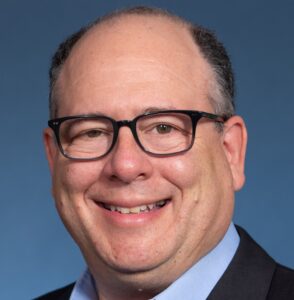Building Equity Bridges: Integrating Network and Tech to Drive Improved Outcomes
ADDRESSING EQUITY, PREVENTION, AND COMMUNITY HEALTH IMPROVEMENT
June 12, 2024 | 4 PM EST
Presented by




About This Session
Join us for an insightful discussion on identifying and bridging the gap for underserved patients. Learn how to leverage technological advancements with existing networks to effectively address equity challenges. Through a comprehensive analysis, gain valuable insights and actionable strategies to drive equitable outcomes.
Key Takeaways
- Trust in a prenatal retail company can dramatically boost engagement among perinatal populations
- Centering maternal mental health can help with identification and addressing care gaps to improve health equity
- When thoughtfully designed, technology has the power to bridge care access barriers and dramatically extend population-level care
Background
- Project Blue Bird resulted from a 2021 Employee Innovation challenge
- The founding Project Bluebird team were new mothers at Florida Blue who felt there were gaps in their care, particularly postpartum
The Program Development Process
Following an iterative research process that involved extensive member interviews and feedback, the pilot program launched with five key objectives:
- Improve identification of social determinants of health, REL, and pregnancy health risks in expectant mothers.
- Expand access and remove barriers to maternal mental health support for prenatal and postpartum members across all levels of risk.
- Expand access and remove barriers to social support.
- Increase sense of well-being and care-seeking behaviors in expectant mothers
- Provide essential, personalized prenatal education to expectant mothers to fill knowledge gaps about critical pregnancy complications.
The Development of Patient Archetypes
Two paths were used to identify key attributes that contributed to identifying the patient archetype for risk for PPDA. Those two factors were health history and protective factors.
Health History
History of depression, anxiety or other mental health conditions, Managing physical chronic conditions, including those requiring Rx routines that may be disrupted by pregnancy, History of high risk or traumatic pregnancies and/or miscarriages.
Protective Factors
Robust support network (family/friends), financial security, less pressure to work prematurely, positive patient/provider relationships, effective coordination of care, health history and RX across providers, easy access to information about healthy pregnancy and postpartum experience, advocacy throughout the pregnancy, ability to effectively navigate the system to find quality care, schedule appointments, discover additional resources.
Two paths were used to identify key attributes that contributed to identifying the patient archetype for risk for PPDA. Those two factors were health history and protective factors.
Predisposed & Unprotected
Highest risk for PPD amplified by SDoH factors
Opportunity: Increase touch points, identifying risks early, delivering key in a relatable format, connecting them to resources they need, providing support and advocacy
Predisposed But Protected
Predisposed to PPD due to health history and SDoH but good relationships with providers and payors, access to care extenders and social supports and system savviness to reduce risks
Opportunity: Increase effectiveness and frequency of screenings. Ensure moms know what to watch for so warning signs are missed. Ensure moms know where to go when needs arise.
Lower Risk But Vulnerable
Lower risk for PPD due to health history but SDoH, limited to access to quality care, poor provider relationships and difficulty navigating the healthcare system increases risk
Opportunity: connect moms to resources they need, deliver key info in relatable format, provide support and advocacy
Lowest Risk
Lowest risk for PPD due to health history, SDoH and a robust support system
Opportunity: Establish payor as trusted, high value resource provider during pregnancy and beyond
Integration Through Network
One of the early goals was to cost-effectively reach expecting members. As a trusted provider to almost half of all Florida Blue expectant mothers, Aeroflow Breastpumps provided a warm introduction to the program through email marketing leveraging the existing relationship between Aeroflow and the patientAeroflow Breastpumps was able to extend this trust to Canopie, and by extension, Florida Blue. Conversion rates from Aeroflow Breastpumps is more than 5x higher than industry standards.
Layering In Technology
Canopie provided a valuable technology solution. For the patient, the solution provided a way for patients to label and cope with their mental health in a way that was accessible and inclusive, matching the treatment with the woman. For Guidewell, it provided a way to identify and triage. The platform provided patients with a way to express challenges and needs that otherwise might have gone unnoticed and unassisted.
Through Canopie’s non-intrusive environment, Guidewell noted 96% of members completed self-directed assessments.
- The highest engagement in Canopie came from Black women
- While Black members were most engaged, they scored lowest on EPDS, but also had the highest risk, raising questions about the cultural competency of screeners
The Solution
Guidewell was able to leverage the engagement brought by the network, Aeroflow Breastpumps, and the technology platform, Canopie, to deliver assistance preventatively to patients. They assembled three care teams to assist the 27% of members who had elevated risk. The care teams consisted of:
- Behavioral Health Assistance: Delivered through Lucet
- SDoH Aid: Delivered through Florida Blue’s Social Worker team
- Clinical Intervention: Delivered through Florida Blue’s Healthy Edition team
The Outcomes
Ultimately, the program demonstrated that health plans can effectively reach expecting moms at scale, intervene preventatively in areas that are traditionally huge gaps, and transform the care experience for mom. The initial research indicated that patients did not see their insurance as part of their care team. By identifying and intervening in highly compassionate, personalized ways, they were able to break that barrier.
Value to member:
- 100% of members surveyed reported the Canopie improved their mood
- 26% of elevated risk members engaged with more than 30 minutes of Canopie’s therapeutic program preventatively
Value to the health plan:
- Black moms were the most engaged with the program, supporting Florida Blue’s health equity goals
- Care gaps that would have been missed otherwise were surfaced and addressed by care teams
Panelists

Michael Cantor, M.D. , J.D.
Dr. Mike Cantor is a geriatrician and attorney who has extensive experience designing and implementing value-based care, quality improvement, and care management programs for healthcare providers and health plans. He works as a fractional (part-time) Chief Medical Advisor for Aeroflow Health, Uber Health, and other technology-enabled health services companies, value-based care organizations and digital health companies. Previous roles include: CMO for Bright Health Plan, an innovative health
insurer; CMO for CareCentrix, a leading outsourced home health, durable medical equipment, and post- acute care benefits manager recently acquired by Walgreens; and CMO for the New England Quality Care Alliance (NEQCA), the physician network affiliated with Tufts Medical Center, where he implemented network-wide quality improvement and care management programs for 150,000 managed care lives. He trained in internal medicine at Beth Israel Hospital in Boston and did his geriatrics fellowship at Harvard Medical School. He has degrees in law and medicine from the University of Illinois.

Brittany Melhado
Brittany Melhado is the Idea Originator/ Business Design and Solution Consultant at Guidewell. Brittany brings over a decade of expertise in process design and improvement to the table, with a rich background in enhancing operational quality and efficiency. Currently serving at GuideWell for five years, Brittany is dedicated to elevating member experiences through strategic and transformational improvements. Notably, she spearheaded the initiative to enhance postpartrum care, focusing on centering women and enriching their journey during this critical period.

Moses Adedoyin
Moses Adedoyin is the Senior Director, Venture Design & Innovation at GuideWell and Florida Blue. In his role, he is responsible for leading new opportunities and ventures from early concepts to market launch.
Moses is passionate about finding creative solutions to complex problems, immersing himself in customer needs and pain points, and pursuing solutions with relentless curiosity and commitment.
Moses has held leadership positions at a variety of companies from early start-ups to large s

Susan Jang
Susan Jang is a Lead Strategist, Venture Design & Innovation (say that five times fast!) at GuideWell, the parent company of Blue Cross Blue Shield of Florida, a $30 billion health solutions company.
Her approach isn’t just about fixing problems—it’s about reinventing how we think about them, all through the lens of human-centered design and User Experience (UX).
Susan’s professional journey reads like a maverick’s playbook. Eschewing the traditional educational route, she has proven that real-world experience and a knack for engaging with people can conjure up innovation magic. At GuideWell, she collaborates with sharp minds in tech and policy to create healthcare services that genuinely puts the patient at the center.

Anne Wanlund
Anne is the Co-Founder and CEO of Canopie, a digital maternal mental health company making mental health a standard part of perinatal care through their universal, low-cost solution. Before Canopie, she spent 5 years leading maternal health organizations in East Africa, most recently as the COO of an award-winning social enterprise that uses technology to improve maternal and child nutrition. She has worked in global health for the State Department, USAID, and Massachusetts General Hospital and has a Master's degree from Tufts University, where she served as a bioethics Teaching Fellow at the Harvard School of Public Health. Anne is channeling her passion and expertise in maternal health and personal experiences with mental health conditions as a new mom to address the enormous care gap.

Jennifer Jordan
Jennifer Jordan serves as the Vice President of the Mom & Baby Division at Aeroflow Health. With a passion for building brands and shaping strategic visions, Jenn has propelled Aeroflow Breastpumps to new heights in the competitive healthcare market. Leveraging her extensive experience in marketing, customer experience, sales and operations management, she has overseen the expansion of Aeroflow Breastpump's reach, forging key partnerships and driving growth in the maternal health space.
Moses has held leadership positions at a variety of companies from early start-ups to large s
Interested in Learning More?

Amanda Minimi
Director of Corporate Development
